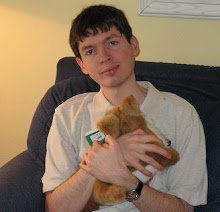Mission accomplished! It turns out the laptop-ready Internet card costs $60 a month with a minimum commitment of two years. Ouch! The question I forgot to ask, of course, is whether there's a way to get the card without the commitment, since I don't expect to be on the road for more than three months. I ran into this problem while apartment hunting, too: there is always a question you forget to ask, so ultimately you always act on incomplete information. The trick is finding some joy in this, which comes from listening to your gut and not making everything an optimization problem. Still, more bills...
Speaking of questions to ask, I want to do my first interview this weekend. Interviewing, however, is a difficult skill! My interviews are going to be what sociologists call "unstructured" in that I'm not going into them with a list of preset questions to ask, but that doesn't mean they don't require preparation. Even apart from needing courage to approach someone -- a private struggle that I'll blog about once I understand it better -- the best way to handle an interviewee is not obvious and probably varies widely. My goal is to get my subject to tell a love story in a way that puts me and my readers on the scene. The first obstacle, once I have a willing subject, is that they may not have a story in mind. I'm coming up with some "kindling" to help get the fire burning -- prompts like "Do you remember your first date?" or "How about a moment that made you very proud or very ashamed?"
Once they've settled on the story, the next obstacle is striking a fine balance between asking questions and listening. I need to be quick to intercept my subject if I need to ask a question about background, whether that's "who's Joanne?" or "wait, why were you swimming in a shark tank in the first place?", lest the tale become incomprehensible. I need to stay curious so that I don't forget to ask important questions (while accepting that to some extent it's inevitable, as I said above). On the other hand, I don't want to tread on the narrative. I can't interrupt them every few words; to some extent I have to trust them to tell their own stories. It's tough. Fortunately, many of the skills involved are a lot like the skills you use in having an everyday conversation -- which I want my interviews to resemble -- so none of this should be completely exotic. The hardest part in some ways may be communicating my sympathy, which is necessary if I expect my interviewee to be open with me, and doing it with subject after subject for however many thousands of miles the journey runs.
A challenge! But then, professional journalists do man-on-the-street interviews all the time and apparently get people to talk to them. I'll keep thinking about what approach to use, while remembering that the body of the interview is basically a special kind of conversation. I can handle conversations.
Wednesday, March 18, 2009
Subscribe to:
Post Comments (Atom)

No comments:
Post a Comment